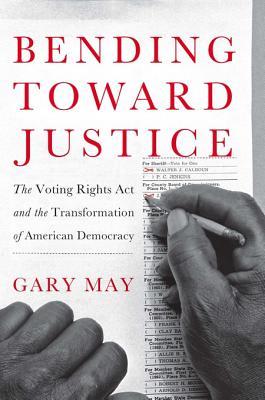
Bending Toward Justice
The Voting Rights Act and the Transformation of American Democracy
کتاب های مرتبط
- اطلاعات
- نقد و بررسی
- دیدگاه کاربران
نقد و بررسی

January 28, 2013
May’s lively and cogent history of the Voting Rights Act is indispensable reading for anyone concerned about the erosion of voting rights that has accompanied the election of Barack Obama, America’s first black president, especially as the issue is still up for debate in 2013, in a case to be heard by the Supreme Court. Drawing on a wealth of sources, University of Delaware historian May (Informant: the FBI, the Ku Klux Klan, and the Murder of Viola Liuzzo) has constructed a vivid, fast-paced morality tale with clearly recognizable heroes, like Student Nonviolent Coordinating Committee organizer Bernard Lafayette, whose commitment to Christian nonviolence transformed a dispirited Alabama town, and villains, like Sherriff Jim Clark, whose propensity for violence inadvertently strengthened Martin Luther King Jr.’s cause. On Bloody Sunday, March 7, 1965, state troopers and local vigilantes in Selma, Ala., brutally attacked a small group of African-American nonviolent protesters. That event shocked the conscience of the nation and led to the passage of the Voting Rights Act of 1965, perhaps the most lasting achievement of the Civil Rights movement. By focusing on Selma, May pays tribute to the courage of otherwise ordinary people and makes a case for the continued relevance of this legislation. Photos. Agent: John Wright.

February 15, 2013
May (History/Univ. of Delaware; The Informant: The FBI, the Ku Klux Klan, and the Murder of Viola Liuzzo, 2011, etc.) explores the agitation for, and the passage and continuing significance of, the Voting Rights Act of 1965. In a meticulous, impassioned narrative, the author describes how determined activists in Selma, Ala., succeeded in mobilizing their community and many others in the Deep South to demand an end to the devious, cynical and violent practices that had excluded blacks from the voter rolls since the end of Reconstruction. Their campaign culminated in the horrific violence at the Edmund Pettus Bridge in 1965, an atrocity that galvanized the nation and forced a reluctant Lyndon Johnson to make passage of a muscular voting rights act an urgent priority. May delivers a fascinating account of the legislative maneuvering required to corral enough Republican votes to shut down the inevitable filibuster by southern Democrats and bring about final passage. After this point, however, the author's exposition loses its way. He needlessly follows Martin Luther King for the remainder of his life, then delves into a tedious summary of the various renewals and amendments to the act as it evolved from controversial enactment to legislative sacred cow. So successful has it been in enabling the registration and participation of hundreds of thousands of minority voters that controversies surrounding its application and even relevance in an era with a black president of the United States have become increasingly subtle and complex. May reviews a number of difficult issues at the core of the act's present significance, including the drawing of appropriate electoral district boundaries, the intent and effect of voter-identification laws, and the continuing legitimacy of pre-clearance provisions applicable only in certain jurisdictions guilty of discrimination half a century ago, but they deserve more thoughtful treatment than the uncritical acceptance of current liberal dogma that May offers. Superb history combined with superficial punditry.
COPYRIGHT(2013) Kirkus Reviews, ALL RIGHTS RESERVED.

March 1, 2013
The Voting Rights Act (VRA), signed by President Johnson on August 6, 1965, was the legacy of the Fifteenth Amendment's (1870) unfulfilled promise of minority suffrage and a response to Jim Crow suppression. So claims May (history, Univ. Delaware; The Informant: The FBI, the Ku Klux Klan, and the Murder of Viola Liuzzo) in a compelling, Howard Zinn-like style, stressing the actions of lesser-known civil rights activists who were willing to die for the right to vote. He clearly explains the complex legislative battles preceding passage of the act, which required LBJ's most persuasive leadership, Martin Luther King Jr.'s awe-inspiring speeches, and Senate minority leader Everett Dirksen's marshaling of his Republican troops to cross the aisle. May demonstrates that the VRA's reauthorizations in 1970, 1975, 1982, 1986, and 2006 required strong congressional guidance, but he asserts that its greatest challenge comes from the current voter ID bills in several states that could disenfranchise minorities, the poor, elderly, and students. VERDICT This lucid investigation of the act's history relates its critical importance to American democracy. For general readers it is a fine companion to James Patterson's The Eve of Destruction: How 1965 Transformed America, which places the act in the context of the year's political events.--Karl Helicher, Upper Merion Township Lib., King of Prussia, PA
Copyright 2013 Library Journal, LLC Used with permission.

March 1, 2013
The Supreme Court will soon consider Shelby County (AL) v. Holder, challenging the pre-clearance provision of the Voting Rights Act (which Congress extended for 25 years in 2006). For readers who don't recall the era before the VRA's hard-fought passage, in 1965, University of Delaware historian May offers an involving narrative of the law's history and consequences. May's prologue sketches African American voting rights from the Emancipation Proclamation to the early 1960s and spotlights national leaders (Rosa Parks, Thurgood Marshall, Charles Evers, John Lewis, James Farmer, Rev. Martin Luther King Jr.) present when Lyndon Johnson signed the bill into law. In the chapters that follow, however, he stresses the critical work of lesser-known activists, like Amelia and Sam Boynton, Bernard Lafayette, and James Forman, and the powerful impact they and their intransigent opponents, Sheriff Jim Clark and Alabama governor George Wallace, had on public and congressional attitudes. May then traces the bill's dramatic legislative history, describes the results of its implementation, examines the issues in its four congressional reauthorizations, and outlines challenges it currently faces. An illuminating history of a law that remains all too relevant.(Reprinted with permission of Booklist, copyright 2013, American Library Association.)

























دیدگاه کاربران